 |
 |
 |
 |
| |
||||
On The Verge Of A Cancer Cure? Part IBreast Cancer 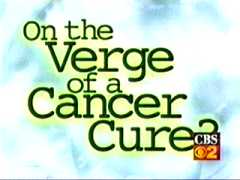 It's quite possibly a woman's deepest fear: finding a lump in her breast. It's quite possibly a woman's deepest fear: finding a lump in her breast. The National Cancer Institute estimates nearly 200,000 American women will be disgnosed with breast cancer this year. But thanks to breakthroughs in cancer research and treatment, breast cancer is no longer the death sentence it once was. CBS 2 News' Ann Martin met some breast cancer survivors and learned about the different procedures that saved their lives. Special Assignment: On The Verge Of A Cancer Cure? Part I aired Sunday, April 19, 1998 at 11 p.m. "In those days, they did radical mastectomys," Mohr told CBS 2 News. "(They) cut you from here to here." Mohr's surgery left her with no muscle on her right side, said Martin. She said the recovery was brutal. Then, two years ago, Marilyn found another lump, this time on her left breast. "I felt a 'twin' exactly on the other side," Mohr said. At the John Wayne Cancer Center, Dr. Armando Giuliano (pictured) has developed a revolutionary surgical technique called sentinel node biopsy. During the procedure, a blue dye is injected into the breast tumor and traced into the lymph nodes (pictured, below). According to Martin, by removing only one or two of the nodes, patients like Mohr are saved from what used to be major, painful surgery. "Rather than undergo an extensive operation that causes some pain, numbness and potentially serious arm swelling, the patient can undergo a relatively small operation that can be done as an outpatient," said Dr. Giuliano. "First of all is that you feel like a person," said Mohr. "You don't feel all chopped up. Let's put it that way." Barbara Bradfield (pictured, below) is another breast cancer survivor, thanks to a new drug called Herceptin. "I felt a huge mass in my breast, so I knew right away that I was in big trouble," Bradfield said. In 1990, Bradfield had a double mastectomy, radiation and chemotherapy to treat her breast cancer. Eighteen months later, it came back with a vengeance -- this time in her lungs. "When we first got approval to take this antibody and put it into patients in the phase one studies. That was an exciting time," Slamon told CBS 2 News. Slamon's team identified genetic mutuations that occur in the tumors of about one third of all breast cancer patients. "It's a particular gene that is altered during the course of the life of the individual," said Slamon. By targeting this gene, Herceptin stops tumor growth in women like Bradfield, who is now cancer-free. "Tamoxifen is based on evidence that when given to women who've already had breast cancer that it decreases the chances of breast cancer in the other breast," said Dr. Darcy Spicer, with USC Norris. Tamoxifen is shown to reduce the chances of breast cancer in so-called "high-risk" women, said Martin. Meanwhile, a study is about to begin on another new treatment at the City of Hope National Medical Center. It's a nasal spray that could make mammograms easier to read. "The goal is to decrease the breast density," said a City of Hope doctor. "That has nothing to do with the size of a breast. In fact, a breast can be large or small and still be dense of not dense, but it's what the radiologist sees when he does the mammogram." "Don't run away from it," advised Mohr. "Absolutely don't run away from it." "There's so much hope now that there's so many different treatments that are out there," Bradfield told Martin. "And even if you have the worst case scenario, I'm here to tell you that even that can bring a good result." Doctors say early detection is critical to any successful breast cancer treatment. Self examinations and mammograms are still the best tools for detection, said Martin. "(People should) take their mammograms and get there early enough instead of saying it'll go away next week," added Mohr. "It won't go away. It'll be there -- so go and take care of it." Contact information:
On the Web:
|
||||||||||

|
||||||||||

 |
||
|
12 p.m.
Woman 2 Woman One of the stars from "Judging Amy" 5 p.m. 6 p.m. 11 p.m.
|
||
 |
||
|
4-5 p.m.
Judge Judy Ruler Of The Free World! 8:00 p.m. 8:30 p.m.
9:00 p.m.
|
||
| |
||
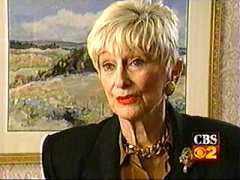 In 1968, Marilyn Mohr (pictured) discovered cancer in her right breast.
In 1968, Marilyn Mohr (pictured) discovered cancer in her right breast. 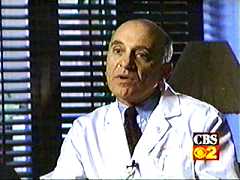 "It was cancer, and we started all over again and I was scheduled to have another mastectomy," Mohr told Martin. "The night before the surgery I said to my husband, 'I can't do this. I'm too old for this.' I cancelled and I found Dr. Giuliano."
"It was cancer, and we started all over again and I was scheduled to have another mastectomy," Mohr told Martin. "The night before the surgery I said to my husband, 'I can't do this. I'm too old for this.' I cancelled and I found Dr. Giuliano." 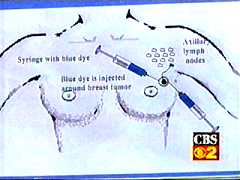 Mohr told Martin there was a big difference between her first and second surgeries.
Mohr told Martin there was a big difference between her first and second surgeries. 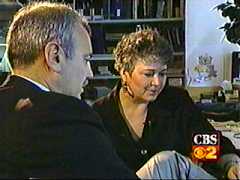 When she met Dr. Dennis Slamon at UCLA's
When she met Dr. Dennis Slamon at UCLA's  And there is still more hope. Tamoxifen is an old drug with new promise for women who may have a history of breast cancer in the family, or who have already had the disease.
And there is still more hope. Tamoxifen is an old drug with new promise for women who may have a history of breast cancer in the family, or who have already had the disease. 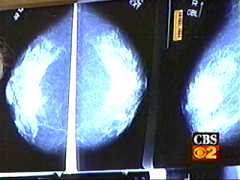 The doctors CBS 2 News spoke with all seem to agree science is moving quickly for women and breast cancer. Survivors like Mohr and Bradfield are living testimony.
The doctors CBS 2 News spoke with all seem to agree science is moving quickly for women and breast cancer. Survivors like Mohr and Bradfield are living testimony. 

